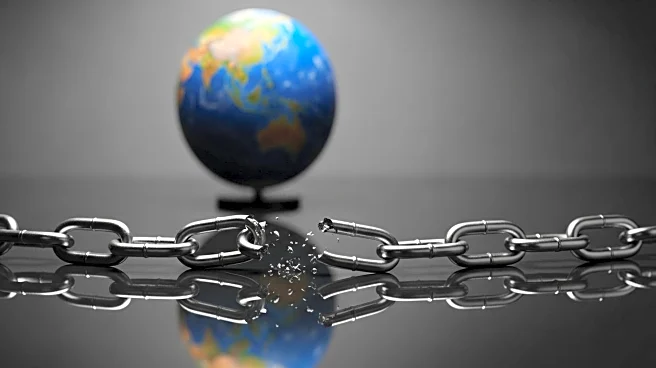What's Happening?
Luis Vayas Valdivieso, the chair of the United Nations plastics treaty talks, has announced his resignation amidst ongoing challenges in the negotiation process. The talks, aimed at addressing global plastic pollution, have been stalled since August when negotiations in Geneva failed to produce an agreement after three years of discussions. Vayas Valdivieso faced criticism for releasing a draft text that was widely rejected by negotiators, including the UK and Ghana, for not being ambitious enough. The draft omitted key elements such as plastic production limits and hazardous chemical mentions. His resignation follows reports of behind-the-scenes pressure from the United Nations Environment Programme (UNEP), which allegedly held a covert meeting to influence his decision to step down.
Why It's Important?
The resignation of Vayas Valdivieso adds further uncertainty to the already stalled UN plastics treaty negotiations. The treaty is crucial for establishing global standards to combat plastic pollution, a growing environmental concern. The failure to reach an agreement could have significant implications for environmental policy and international cooperation on pollution control. The involvement of UNEP in the controversy raises questions about the transparency and governance of the negotiation process. The resignation highlights the challenges faced by international bodies in balancing diverse interests and pressures from member states and industry lobbyists, which could impact future environmental treaties.
What's Next?
With Vayas Valdivieso stepping down, the UN plastics treaty process faces a leadership vacuum that could delay further negotiations. The search for a new chair will be critical in determining the future direction of the talks. Stakeholders, including environmental NGOs and member states, are likely to push for a more transparent and inclusive process to restore trust and ensure meaningful progress. The UNEP's role and actions during the negotiations may come under scrutiny, potentially leading to calls for reforms in how such international negotiations are conducted.
Beyond the Headlines
The resignation underscores the broader issue of how international environmental agreements are negotiated and the influence of powerful industry lobbyists. The plastics treaty talks have been plagued by the interests of petrostates and the plastic industry, which have reportedly worked to derail efforts to limit plastic production. This situation highlights the need for stronger mechanisms to ensure that environmental treaties are not undermined by vested interests, which could have long-term implications for global environmental governance.









